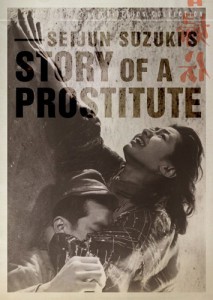
In WW2 Manchuria, a prostitute grows to resent an abusive adjutant and falls in love with his aide.
Read More »
Tag Archives: Japan
The Heart Is Deceitful Above All Things (2004) Asia Argento, Dylan Sprouse, Cole Sprouse, Drama

The dysfunctional twenty-three years old Sarah takes her six year old natural son Jeremiah from the home of his beloved foster parents with the support of the social service to live with her. Along the years, the boy shares her insane and lowlife style and is introduced to booze and drugs and mentally, physically and sexually abused by Sarah, her lovers and her religiously fanatic family.
Read More »
Station / Eki (1981) Yasuo Furuhata, Ken Takakura, Chieko Baishô, Ayumi Ishida, Drama
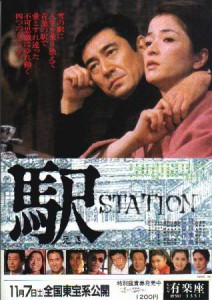
A very beautiful film. This is a Ken Takakura vehicle, and as such follows his formula. Takakura plays to type as the laconic brooder who suffers multiple tragedies with manly stoicism. While the variety of his film varied greatly, his films with director Yasuo Furuhata were always of the highest quality, and this is no exception. Takakura is a cop training to be a sharpshooter for the Olympic games, he divorces his wife and abandons his daughter when he discovers she’s had an affair. Later his coach is gunned down by a fleeing criminal. Years later Takakura returns to his snowy hometown and starts an affair with a middle-aged bar owner. The story is a bit thick, with a number of subplots, yet it is extrordinarily melancholic, as Takakura seems to regret everything he’s done in his life and is made over and over again to relive his mistakes. There is very little “action” as such, and no yakuzas of any kind; but beyond that this is one of the most lushly beautiful and emotional films you can see (if you can see it), with an excellent score by Ryudo Uzaki.
Read More »
Minagoroshi no reika / I, the Executioner (1968) Tai Katô, Chieko Baishô, Yuki Kawamura, Sanae Nakahara, Drama
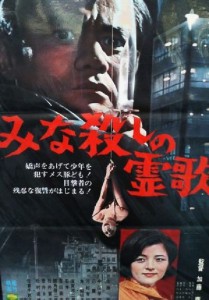
Police investigators investigate the link between a serial killer’s machinations and a young man who committed suicide after five women raped him.
Read More »
Early Spring / Sôshun (1956) Yasujirô Ozu, Chikage Awashima, Ryô Ikebe, Teiji Takahashi, Drama
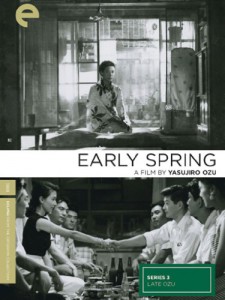
A young man and his wife struggle within the confines of their passionless relationship while he has an extramarital romance.
Read More »
Maria no Oyuki / Oyuki, the Virgin (1935) Kenji Mizoguchi
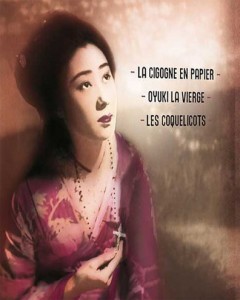
Oyuki, the Virgin is based on Kawaguchi Matsutaro’s adaptation of Maupassant’s “Boule de Suif” (“Lump of Fat,” also the inspiration for Ford’s Stagecoach). To this story Mizoguchi added some of his own elements. Maupassant’s original work, set during the Franco-Prussian War, is the story of a group of people who try to flee the battleground in a horsedrawn carriage. The bourgeois use the expression “lump of fat” to refer sarcastically to the prostitute who is riding along with them. When they are caught by the enemy, they offer to send her to the commander as a human sacrifice. This done, when they leave the battlefield the next day, all they do is censure her and call her vulgar.
Read More »
Hachi no su no kodomotachi / Children of the Beehive (1948) Hiroshi Shimizu
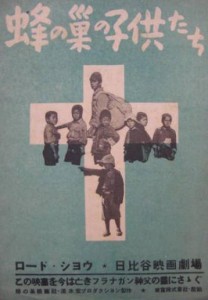
The movie focuses on the plight of ten war orphans hailing from different cities across Japan. With nowhere to go, they scavenge around train stations, scratching out an existence by means of black market work for a one-legged tramp whilst avoiding being picked up by the police for vagrancy. Soon however, they find a more inspiring role model in the figure of a nameless soldier just repatriated after the war. An orphan himself, the soldier also has no home to return to, and so sets out across the country with the kids in tow in search of work before settling on the goal of leading them to the orphanage where he himself grew up.
Read More »
Nihon kuroshakai / Ley Lines (1999) Takashi Miike, Shô Aikawa, Samuel Pop Aning, Takeshi Caesar
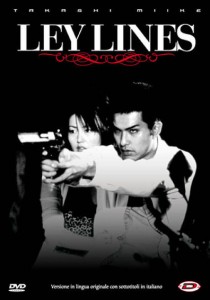
A group of Chinese youths living in Japan struggle to make their way in life and eventually find trouble with the local crime syndicate.
Read More »
Sûpâ no onna / Supermarket Woman (1996) Jûzô Itami, Nobuko Miyamoto, Masahiko Tsugawa, Ryûnosuke Kaneda

Goro’s supermarket is not doing well; the rival “Bargains Galore” threatens his business. A chance encounter with Hanako, an energetic woman he knew in grade school, results in big retail and life changes.
Read More »
Ohara Shôsuke-san / Mr. Shosuke Ohara (1949) Hiroshi Shimizu, Koume Akasaka, Akiko Kazami, Denjirô Ôkôchi

Saheita, the final heir of a once rich and respectable family, can’t refuse the many villagers that come to him for favours and money, even though he is on the brink of bankruptcy. Around town he is better known by his nickname Mr. Shosuke Ohara.
Read More »